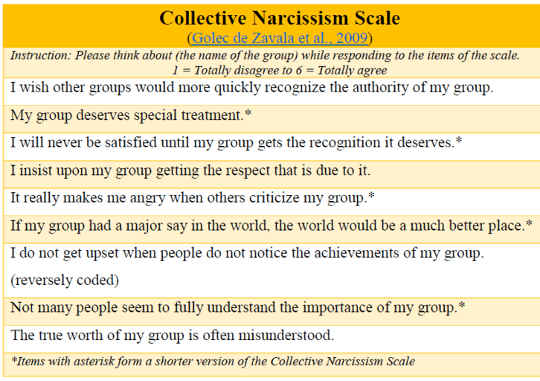
Consider slogans such as “Make America great again”, used by Donald Trump, or “Take back control”, used by the Brexit campaign. They suggest that in the US and the UK, the unique position of the nation has somehow been undermined – and that somehow it needs to be restored.
Both slogans were the perfect pitch to mobilize what are called collective narcissists. These are people who want their group to be constantly recognized by others. They are hypersensitive to any signs that it is not.
The central feature of narcissism is emotional dependence on admiration and recognition by others. When that admiration is sought on behalf of a group, narcissism becomes collective. The two forms of narcissism are not strongly related, however. Individual narcissists are not automatically collective narcissists.
The term “collective narcissism” was first used by Theodore Adorno to describe the sentiment that gave support to Nazi rule in Germany in the 1930s. Our ongoing research in the UK and US suggests that people who agreed with the statements on our collective narcissism scale were significantly more likely to report that they voted to leave the European Union in the June 2016 referendum in the UK. They were also more likely to report that they voted for Donald Trump in the US presidential election.
The scale includes statements such as “It really makes me angry when others criticize my group” and “My group deserves special treatment”. Participants are asked to think about a group they might belong to, such as a religion or a nationality, when considering the statements.

We should worry when collective narcissists rise to power because scoring highly on the collective narcissism scale predicts being prejudiced, regardless of people’s age, gender or education.
Collective narcissists are prejudiced selectively. They reject or attack groups that somehow threaten their group’s grandiose image. Collective narcissists also embrace their own bigoted attitudes. They spin and believe in conspiracy theories about the groups they reject, however fantastic they might be.
In studies conducted last year in Poland, Catholic collective narcissists believed there was a gender conspiracy working against them. They agreed with statements like: “Gender (ideology) was created to destroy the Christian tradition”; “Gender is a threat to Christian morality”; and “The purpose of gender is to destroy family”. As a result, collective narcissists rejected anybody who presented progressive views about gender roles or sexuality.
Collective narcissists also desire revenge on anyone who doesn’t sufficiently recognize their group. In our studies, national collective narcissists in the US read a fictional interview with a foreign exchange student who didn’t like some aspects of their exchange experience. After reading unfavourable comments about their country, collective narcissists expressed hostile behavioural intentions towards all compatriots of the exchange student.
The same pattern was repeated when collective narcissists identified themselves as part of a national group. When their group was criticised or not properly recognised, collective narcissists advocated hostile revenge, ranging from insult to injuring. In another study, we suggested to collective narcissists in Poland that new chemical elements were discovered through international collaboration but not named after their country. In response, they advocated hostile confrontation with those who did not want the elements to be named after their country.
Collective narcissists also see insult where no one has seen it before. For example, for a transgression as petty as a joke made by a celebrity about their country’s government, people in our study threatened physical punishment and engaged in schadenfreude, openly rejoicing in the misfortunes of their “offender”.
Have the collective narcissists won?
There seems to be no limit to what collective narcissists can interpret as offensive to their group. Consider inter-group comparisons. In one of our studies, Portuguese collective narcissists were hostile towards Germans because they thought Germany had higher status and more power in the European Union than Portugal. So another group may be rejected, marginalised or otherwise “punished” for being better or even as good as one’s own.
All this suggests that arguments such as “Foreign workers contribute to the national economy” or “Refugees can find jobs and prosper in host countries” may not only fail to convince national collective narcissists, but actually threaten and enrage them. Success for another group or empowerment for a minority threatens the majority’s privileged position. Collective narcissists want to protect the privileged position of their group by undermining other groups’ qualities and motivations.
Consider also that for those who seek recognition for their group, the worst offense is for their group to be ignored. According to collective narcissistic logic, such an offense needs to be avenged. This creates the potential for political antagonism and even violence when groups of this kind feel ignored in political processes. Collective narcissists are more likely to advocate violent revenge for lost grandiosity and gravitate towards similarly minded group members.
This is the sentiment that seems to be currently shaping our world. Collective narcissism was mobilised in support for Brexit and Trump. It won. Collective narcissists’ attitudes and reactions were so legitimised in leading democratic countries.
The pre-referendum and pre-election rhetoric mobilised collective narcissists’ sense of inter-group threat and reactive inter-group hostility. It was irresponsible to mobilise them, because we don’t really know how to address them constructively.
Our recent data show that the self-esteem of individuals within groups of collective narcissists is low and their emotions negative. They avoid interpersonal closeness and are vulnerable to shame. Investing in the group’s exaggerated image seems to be their dominant way of fulfilling universal need for positive social connections.
Perhaps being involved in democratic processes and institutions can equip collective narcissists with more constructive and less parochial ways of connecting to others. To discourage further escalation of inter-group animosities, we need to understand collective narcissists better as it’s clear they are not going away.
About The Author
Agnieszka Golec de Zavala, Senior Lecturer in Psychology, Goldsmiths, University of London
This article was originally published on The Conversation. Read the original article.
Related Books:
The Narcissist Next Door: Understanding the Monster in Your Family, in Your Office, in Your Bed-in Your World
by Jeffrey Kluger
In this provocative book, bestselling author and science writer Jeffrey Kluger explores the fascinating world of narcissism, from the everyday to the extreme. He offers insight into the narcissistic personality and how to deal with the narcissists in our lives. ISBN-10: 1594633918
Click for more info or to order
The Covert Passive-Aggressive Narcissist: Recognizing the Traits and Finding Healing After Hidden Emotional and Psychological Abuse
by Debbie Mirza
In this insightful book, psychotherapist and author Debbie Mirza delves into the world of covert narcissism, a hidden form of emotional and psychological abuse. She offers practical strategies for recognizing the traits of covert narcissism and finding healing from its effects. ISBN-10: 1521937639
Click for more info or to order
The Narcissistic Family: Diagnosis and Treatment
by Stephanie Donaldson-Pressman and Robert M. Pressman
In this seminal work, family therapists Stephanie Donaldson-Pressman and Robert M. Pressman explore the dynamics of the narcissistic family, a dysfunctional system that perpetuates narcissism across generations. They offer practical advice for diagnosing and treating the effects of narcissism in families. ISBN-10: 0787908703
Click for more info or to order
The Wizard of Oz and Other Narcissists: Coping with the One-Way Relationship in Work, Love, and Family
by Eleanor Payson
In this enlightening book, psychotherapist Eleanor Payson explores the world of narcissism in relationships, from the everyday to the extreme. She offers practical strategies for coping with the one-way relationship and finding healing from its effects. ISBN-10: 0972072837























